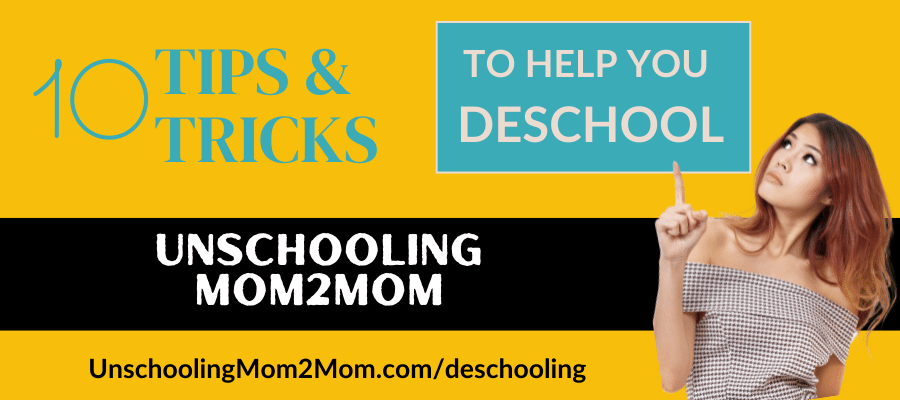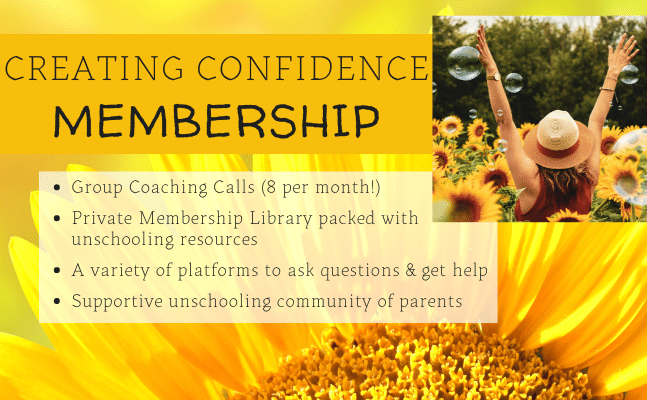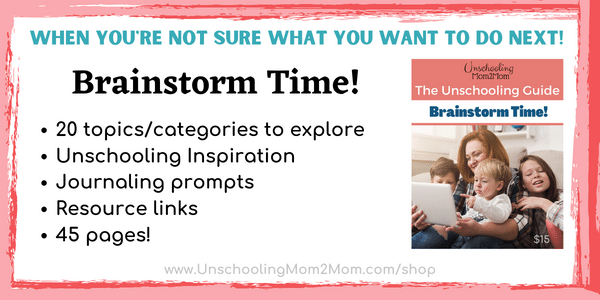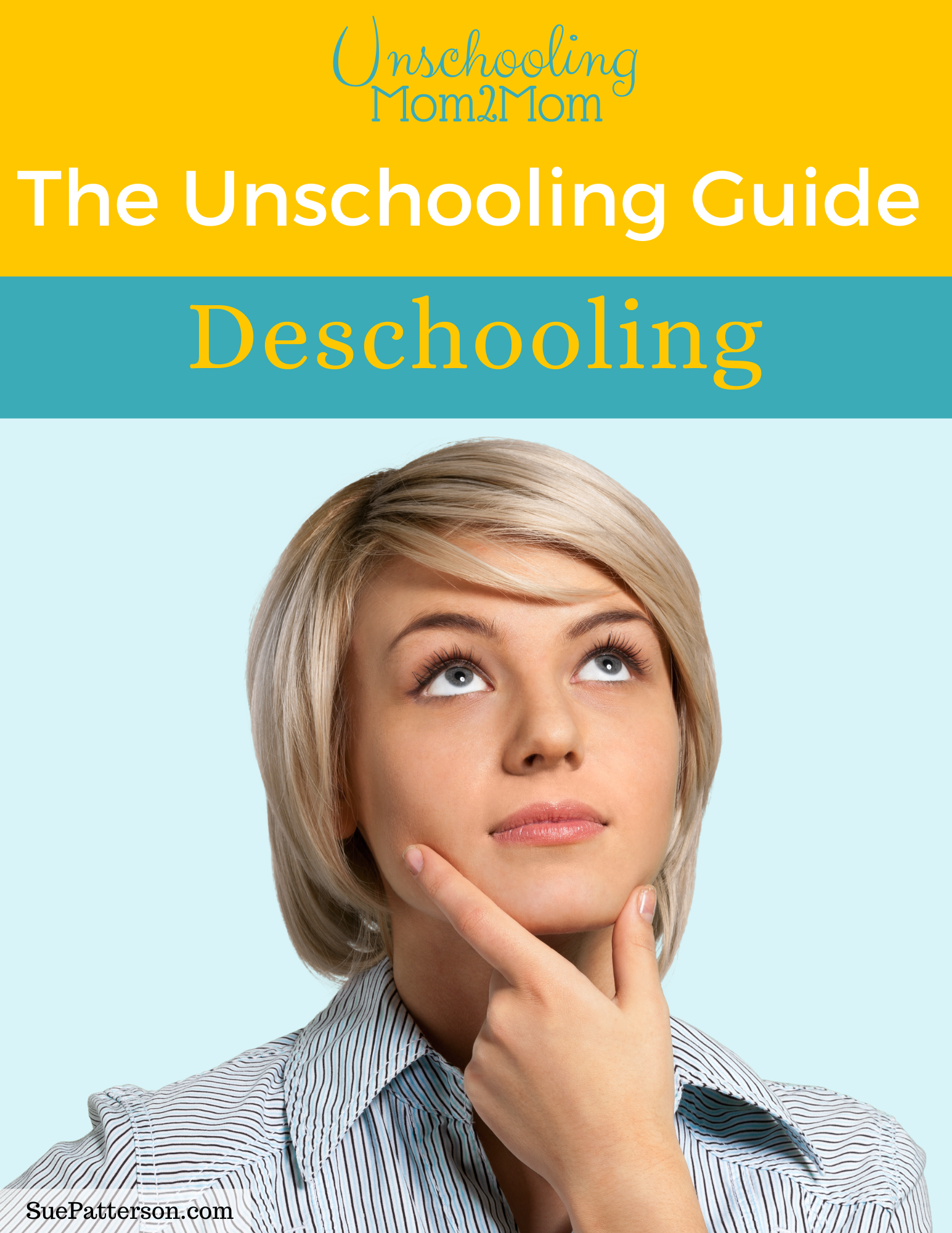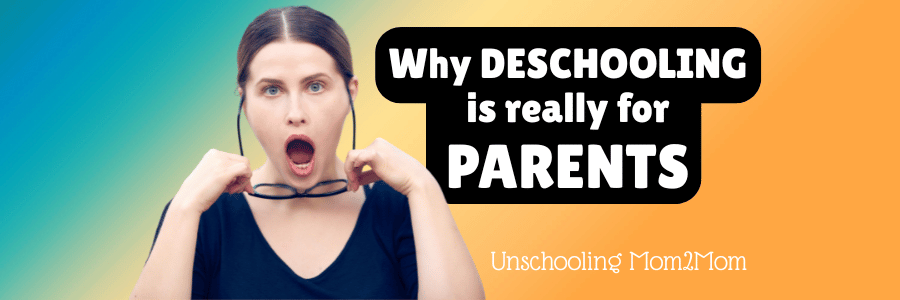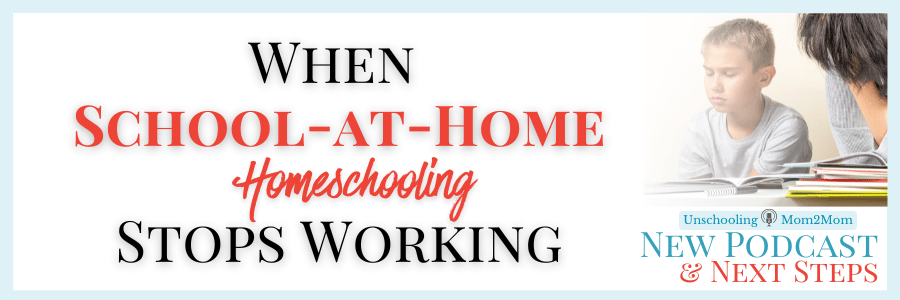10 Tips to Help You Deschool
1. Focus on Learning Instead of Teaching
Do you notice that you’re thinking about planning lessons, turning interesting movies into “educational experiences,” creating a cute school room in your house? These are all examples that you’re losing touch with the most important focus: The Learner and their learning. What interests them? What brings them joy? What could you help them explore more fully?
2. Don’t worry about “gaps” or “keeping up.”
Comparison can really do a number on us! One size really does NOT fit all. It doesn’t matter if your child learns anything by a particular time frame set by schools – that’s THEIR issue, not yours anymore! If your child is interested, they will learn it and actually remember it. If not, it’s a waste of everyone’s time. Unschoolers learn how to use resources to solve problems. So gaps can be easily resolved when they need to be. “Hello, Siri?”
Read/Listen to: But What About Gaps?
3. Deschooling Takes a While
In unschooling circles, you might hear someone mention this "formula" for deschooling. It's a way to help parents see that they may need more deschooling time than their kids - because they've spent so much more time in a school environment.
So if you went to school through high school, you went for 12 years.
The formula would say, "It will take you at least 12 months to deschool." (1
month for every year.)
For those who went to college too, add additional months of deschooling - one for every year of additional schooling!
For those of you with graduate degrees - YIKES! - You may have a long deschooling road ahead!
Don’t rush through deschooling. Find out what triggers your “schooly thoughts.” Focus on undoing some of that irrational thinking. Some people say that you should anticipate deschooling one month for every year you went to school. Sometimes it’s not exactly like that though. Children go through different developmental stages and various expectations can pop into our heads that set us back.
We may understand deschooling well while our kids are all playing and learning at 6, 7, and 8 years old. But then when adolescence rolls around, we start worrying again...gaps in learning, getting into college, missing out on high school events... and we’re back to Square 1 on Deschooling again.
But that’s ok, because you know how to undo this kind of thinking.
Still, if you want a ballpark idea, the formula for "months-to-years-in-school" is a good starting place.
Read/Listen: Deschooling - For HOW Long??
4. Continue to read about unschooling and how children actually learn.
It’s always been interesting to me how schools don’t (or can’t) implement some of their own best research about learning. Homeschooling/unschooling parents can though! We have so much to learn. And with the internet, it's all so accessible!
Read more about Unschooling
Subscribe to Unschooling Updates
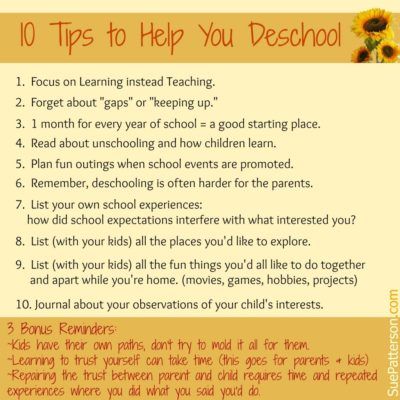
5. Plan Fun Outings at Specific Times of Year
Do “Back-to-school” ads get under your skin? Or maybe it’s those end-of-school year parties or even prom that makes you wistful. Those school experiences can pale if you plan a great trip or do something particularly fun when those events roll around. Perhaps it’s time for a beach trip or a campout? Maybe a road trip or some theme park hopping? The lines are usually so much shorter once school has started – take advantage of that! Remember, it won’t be long before the parents/children are all complaining again about how they find school to be boring/annoying/cumbersome… so distract yourself and your family in the meantime!
6.) Remember, deschooling is harder for parents than kids.
It stands to reason that you spent a lot more years entrenched in the school system than your child. You’re likely to have far more stories in your head of what learning is supposed to look like. Those won't help you anymore.
Also, parents sometimes feel an additional stress when they share what they’re doing with their friends, family and co-workers. Removing yourself from the competitive/comparative discussions that happens between parents, can be isolating too.
It helps to surround yourself with other parents on this unschooling journey - sharing ideas, supporting each other.
You really don' t have to do this alone!
The Creating Confidence Membership is available for any parents who'd like more unschooling support!
7.) Did your own school experiences interfere with your goals?
Sometimes school expectations caused us to shelve our own interests. It's time to remember what that was like.
Some of us can go straight to the grievances we had with our school experience. We know what we wanted to do and how we didn’t get time to do it. We know how we have not used those things we were promised we’d need in our adult lives. What would you have spent more time on?
Sometimes we glamorize our school experiences, focusing on a hand full of great memories. Try to really examine how “great” they were – was it because everything else was so dull? how does it compare with what you can offer your child? Could it actually happen more frequently without the limitations of schools and schedules?
8.) Brainstorm where you'd like to go!
List out - with the kids - all the places you'd like to explore but were too busy before. Let me get you started: museums, parks, festivals, downtown areas, nature centers, the beach, the lake, picnics, camping trips, day hikes, bike rides, yoga classes.
Chambers of commerce have brochures about interesting places near you – as do interstate info centers, websites like (365 Fun Things to do in… ) & yes you can write that in the URL and it will give you some ideas, and even Pinterest!
A few surprise benefits exist when you choose to do this. Everyone practices a little cooperation and consensus, and gets a little clearer idea about family members’ interests and curiosities. Sometimes, one child *thinks* they aren’t interested in something their sibling wants to try. But after going, they discover they enjoyed some aspect, and a new interest begins. (Or, maybe they just learn that it wasn’t as bad as they thought it would be, and they can focus on happy it made their sibling that they participated.
9.) Brainstorm fun activities at home.
Get with the kids to think about all the fun things you can do together as well as solo. Movies, board games, card games, videogames, TV shows, painting, drawing, collage, building projects, meditation, blogging, art journals, skyping with friends, going on walks, walking the dog, playing with pets, cooking, creating YouTube/vimeo videos, photography, daydreaming, planning. The list can go on and on!
Identifying activities that anyone can do at home – that are interesting to them – is a fabulous skill that many wish they had. You have the opportunity to help your child figure out how to spend their own time, not waiting for someone to tell them what to do.
10. Observe your children’s natural inclinations.
Get in the habit of slowing down and watching your children. We are always in such a rush to be sure no one “misses anything.” And, in doing that, we miss out on what’s right there in front of us. Your kids are really giving you clues and cues as to what interests them – there’s no need to look to outside experts for lesson plans or curricula. Find out what they like to do, what makes their eyes sparkle! Spend more time with them and you will find that you are growing the connection with them. THIS will be the biggest benefit of deschooling.
Unschooling Guide: Deschooling
You may feel ready to jump right into unschooling, but have you take the time to deschool?
Have you looked at some of the ideas you're carrying over from your own school experiences and upbringing to see if those are really applicable in your lives now.
This Unschooling Guide - a 20-page mini-magazine, will walk you through.
You'll learn about:
- Practical solutions for issues that arise in your home during this phase
- How to cope with community criticism
- Looking back on your own school experiences and how they affect you today
- Deschooling tips about learning, parenting, and the kids
- Strategies for connecting more with the children as they deschool
- Journaling prompts to dive deeper
- Even an "Unschooling Curriculum!" ????
DON'T SKIP PAST THE DESCHOOLING PHASE
...REGARDLESS OF YOUR HOMESCHOOLING METHOD!
Let me share years of experience so you don't have to reinvent the wheel!


